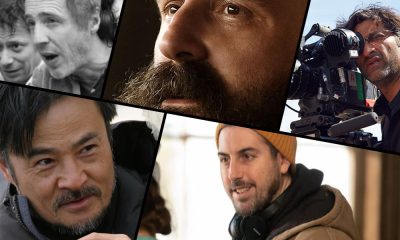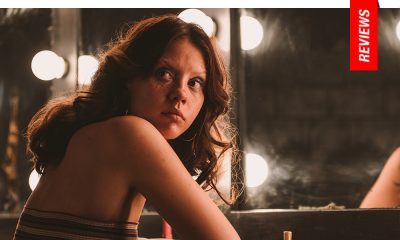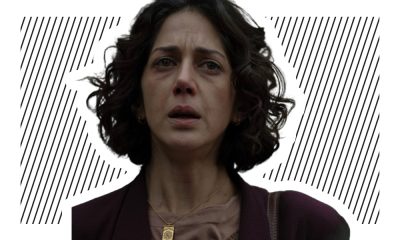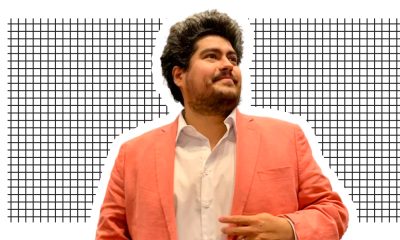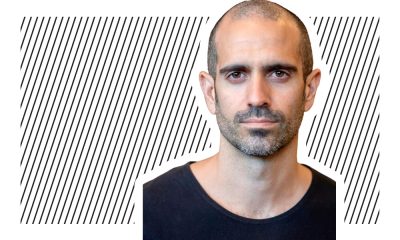Interviews
Interview: Ti West (The Innkeepers)
Jordan Smith: The Innkeepers comes out on DVD/Blu-ray today, but it was available on VOD for a month before it arrived in theaters. How do you feel about this release style?
Ti West: I think it’s great! I’ve done 2 pictures with Magnolia Pictures now, and that’s their business model, and at first I didn’t understand it before the release of House of the Devil. Once that happened it was very successful that way. It made a lot more sense to me. And I think, you know, you’d always rather have people see your movie in the theater, and I continue to make movies to be seen that way. But, there’s the reality that when you’re making independent movies, like, they aren’t going to come out on 3,000 screens. So, you can either not see them, or you can offer up something like VOD where it’s like if you live in a place….I mean, The Innkeepers came out in pretty much every major city, but if you don’t live in one of the major cities, you can’t see it. So, instead of waiting four months for the DVD, now there is an additional way to watch it on your TV at home. So, it’s a great way I think. It’s very consumer friendly, and it brings the movie to people. Umm…Like I said, I know people would rather see it in the theater, but if that’s not an option, it’s good to have this option.
JS: You’re known for having kind of a throwback style, with patience and character building in a genre currently over run with fast paced extremism. What attracts you to this old school style?
West: I think it’s just my taste. You know, it’s not really on purpose. People think that I have this sort of, like, retro theme, but it’s really just the way my brain works. Ummm…I think I have old fashion sensibilities. I think that the movies that I was the movies I was most effected by are movies from when was younger, or just growing up, or, you know, before my time, the movies I watched that are sort of like, great history movies. That’s what I perform by. So, the way I set up my movies if mostly influenced by the very kind of classic style of filmmaking. And yeah, as far as the slow burn thing, and things like that, it’s weird. Once people started calling The Innkeepers slow burn I realized that not only did I not understand it, but I had no control over it, so I just had to let it go, and most people mean it as a compliment, but it’s one of those things, like, to me it’s like, well this is the only way I can see this scene playing out in my head. So, I imagined it this way. And then people will call it slow paced, and I’m like, “really?” But, so, it’s kind of like hearing your voice on tape. It sounds weird when you hear it, but it doesn’t sound weird to anybody else. So that’s kind of how it feels. It doesn’t seem weird when I do it, but when I hear everyone comment I go, “huh?” I’ve heard enough people say it that it must be true, but I’m not really in control of it I guess.
JS: What are some currently working directors you really appreciate or you’re really excited about?
West: Ummm….I think that Edger Wright is really exciting, and I think that uhh…the guy that made Let The Right One In and Tinker Tailer Soldier Spy, umm, Tomas Alfredson. I think those two are….and Lars Von Trier. The three of them. I will always look for their movies coming out. I think that Edgar Wright is the most dense film maker working today. I saw him last night, and I told him, “I think you try harder than all of us, and I don’t know if I can do it.” Like, when I look at his movies, they are so dense, and he chocks it up to preparation, and he’s right, he’s just really prepared. But, like, I think I’m really prepared, and when I see his movies I think, “Man, like, there is just….he had every little inch figured out and that’s impressive to me. And I think, you know, his movies are really great. And I think Lars Von Trier does stuff in movies that no one else on the planet does. I don’t know whether you like the movies or not, but I look forward to seeing them because I don’t ever know what I’m stepping into, and that’s rare feeling that way seeing a movie. And having watched Tinker Tailer recently, it was a work out trying to figure out what was going on in that movie. Like, I had to really pay attention, which you never have to do in movies anymore, and that was exciting to me. Just to have to, like, actually sit forward in my chair and be like, “So…what? And actually have to respond to the movie. Cause I’ve gotten so used, like everyone else, to, like, just not care. I just like that he kind of made me step up my game, and the audience.
JS: The Innkeepers is based in The Yankee Pedlar, which is the hotel you stayed in during the making of House of the Devil. I’m sure you became extremely familiar with the hotel before Innkeepers, so I’m curious what kind of set dressing was done to make it photo ready?
West: Well, we did a lot, but you would never know that we did anything. So, preparing, I thought we would just walk in and start shooting, cause I remembered it so clearly, but when you get there, you kind of go, “Hmm…that wall is really white. We should do something about that.” Then you paint it a different color, and you think, “You know what would be great? If this was there…,” and you start adding little things, or you go in a room and you think, “This room is perfect layout wise, but I hate the wallpaper in here, and the wallpaper in the other room is better, but the layout sucks, so let’s just wallpaper this room.” So, you start to do things like that, but if you walked in the Pedlar today, you would think we changed nothing. Like, you would feel like you just walked right into the movie because it’s all little stuff like that that we did. You know? In the grand scheme of it, it looks the same. And even down to the…if you walk in, the people at the front desk…they wear the same outfits as the people in the movie do. It’s a really surreal experience to go in there because it feels like a Universal Studios ride. You go in and you’re like, “Wow, this is…I can just walk around in here just like the movie. It’s really weird.
JS: The film feels very personal. I know you wrote it, it’s about the hotel you stayed in, but its also supposed to be an ode to minimum wage jobs, and I’m curious to know more about that.
West: Yeah, I mean, that was really the reason for making it. I wanted to make a charming ghost story and I wanted to make a movie about minimum wage jobs because it’s all….I don’t have…I’m not good at anything. I can make movies or be a bus boy. I don’t know how to do anything else. So, you know, I’ve had every minimum wage job there is. It’s not something that’s displayed in movies, and I think the weird insular roles of your work friends is appealing to me, and funny, and I think this is a good way to sort of charm people into relating to and liking the characters, which will make it extra scary when all the scary stuff happens. So, that’s kind of where the….And I also thought the idea of being stuck in a minimum wage job is like….there really is no potential growth there, and you find yourself just feeling stuck there, and I feel like that’s how I felt 16 to 26. I just felt like, “I don’t have any other ideas or anything to do, so it’s not bad that I’m here. I’m not digging ditches, but I feel stuck here,” and I feel like that is a good juxtaposition to what a ghost story is, and those ghosts being stuck as well. So, I just thought that was an interesting angle that I hadn’t really seen before.
JS: There are multiple ways to interpret the film. Either Leanne’s visions are true, and there is something actually haunting the hotel, or Claire’s imagination eventually got the best of her. Could you speak a little on that?
West: Yeah, I mean a big part of the movie for me was perception. And, you know, there is no clear cut case. You can make a strong argument there were no ghosts, or you could make a strong argument that there were ghosts, and you could argue about it all the way home, and it’s supposed to be what you like, you know? That was important to me. Just the same, every character, you perceive them as kind of one thing, and then at some point in the movie you find out they are not exactly what you expected. And that was important to me, was to be….when you tell a ghost story it is about perception, and it is about how can one person so adamantly think this, and another person not. You know, I felt like it was important to keep that relevant in the story.
JS: What is your writing process like? Do you set time aside strictly for writing, or is it an organic in the moment of inspiration kind of thing?
West: No…maybe coming up with the idea has a moment of inspiration thing. The actual writing process for me is like a very….I find that I can only write for a few hours a day, in the middle of the night. Like, trying to do anything else doesn’t work well for me. So, I do it very quickly. Like, I can bust a lot out. I can’t be productive all day, but in two hours I can write 40 pages. It’s like a weird procrastination thing. It’s just the way my brain works. There is only a limited about of time I can be creative in a day, but I can do a lot in one sitting. So, I try to basically set aside a week to write a script, and, I just, you know, and I tell my friends, at night, for a week, I’m not going out. And this is all I’ve got where there is order to just do this, and that’s what I do. I just sort of crank it out, and….It’s kind of brutal, but at the end of that week you kind of put down he script and go, “Oh wait! This exists now, and it didn’t a week ago, and it wasn’t that hard to do.” But, I can’t just do a little bit here and a little bit there. I have to…like, I try to write, if I can, I try to write it all in one weekend, and just kind of get it over with, and then go back, and clean it up, but yeah, if I take longer than a week, I start to think….I think of other ideas, or I get insecure about the idea, and I don’t want to do it anymore. So, the faster I can do it, the better. Thing about writing is that it’s not actually that hard, but it’s really easy not to write. It’s sort of like exercising. Going to the gym or going for a run, like, it sucks, but it’s not that hard, but not going to the gym is awesome. It is so easy to not go, and that’s what writing is. Like, it’s not that hard to write a movie. It’s not easy, but anyone could do it, but like, not doing it is really easy to do. Like, it’s really easy to just sit, and go on the internet, and not write, and so, I think that’s what happens. The same thing happens. I should go for a run today, but I probably wont’ because it’s way easier not to.
JS: Sound is so important in horror films especially, and in this it is integrated so well. You’ve been working with sound designer Graham Reznick and Composer Jeff Grace since you started making films, so I’m curious to know how you got to know them.
West: Well, I grew up with Graham. I’ve known him since we were like in kindergarten, and so that’s kind of that. We both moved to New York when we were 18, and it’s just similar things we were interested in – movies. So, we just collaborated. Graham s really my secret weapon. I mean, a lot of times he’ll make scenes scary. In particular, my movies I leave a lot of room for sound design to complete the narrative, which a lot of people don’t do. So, it’s great to have someone as sound as him help me out there. And then Jeff I met on the first movie because Peter Phok, who produces all my movies…I don’t know how he met Jeff…at like, some short film screening or something, and I didn’t know anyone else, and he was like, “Well, I met this guy,” and I had called him, and he had just finished working on Lord Of The Rings, and he was Howard Shore’s right hand man, and I was like, “Wow, this puts me two degrees from Peter Jackson, so that’s pretty awesome.” And, then he turned out to be really good, which was like, stagger because we didn’t know. I didn’t really know him. I listened to his stuff, and it was fine, but it wasn’t for the movie, so who knows? But he did a great job on The Roost, and then we got along really well, so we just kept doing it, and now he’s on every movie ever since, and I image we’ll continue to do that. I’m very fortunate. Graham and Jeff are really the unsung heroes of these horror movies for sure.
JS: I want to touch on some of your newer stuff before I let you go. I know you’ve contributed to a couple of anthology films, V/H/S, which premiered at Sundance, and The ABCs of Death. How did you get involved, and do you think the format is making a comeback?
West: Umm…I don’t know that is really coming back, but I had a weird spurt where I did two of them right in a row. What happened was that with V/H/S, this company called and was like, “We’re doing this anthology, do you want to be involved?” and I was like, “I don’t know. I know know if that’s my thing.” And they were like, “Well, here’s the people we are trying to get…,” and I know a lot of them. I was like, “I know them.” And they were like, “Well, if you want to do this, for real, like, you can go do it.” So, the money was there, we had money to make the movie. I had total creative control, and I thought, “You know what? Let’s give it a whirl. All I had to do was make it found footage, and that was it. Anything else I could get away with. So, I went off, made this movie with some friends, and it turned out well, and then I delivered it, and kind of moved on, and they got most of the people that they told me they were gonna get, and they were all people I knew, and they made their sections, and then we all kind of saw it for the first time at Sundance, and thankfully, it turned out well. Ummm…and ABCs of Death is a thing that Tim League and Ant Timpson and the guys who produced the movie for years asked me to be part of it, and I think those guys are the greatest, and there are a lot of other great filmmakers on that project as well. So, I was down to do that. I don’t know…I think that’s probably the end of my anthology run, those two movies, but you never know.
JS: I know you are also in pre-production for sci-fi horror film titled The Side Effects starting Liv Tyler. Is there anything you can say about that?
West: Yeah, it’s in the future, and it’s like a pandemic and there is a pharmaceutical company trying to find a cure for it, and they’re testing, like, radiation on human tissue samples. So, Liv Tyler is a…she’s up on a space pod doing these testing by herself, and she discovers that she’s pregnant, and she’s all alone in outspace, so it doesn’t make any sense. So, they send like, a team to come rescue her, and most of the movie is the team picking her up, and taking her back to base camp, and trying to figure out what’s going on, and not freak out.
I’ve read in older interviews that as a teen you wanted to be a comedian, and you can see that in The Innkeepers quite a bit. Do you think you’ll ever make just a straight comedy film?
Ummm….Yes. I think that my horror days are numbered. Not forever, but I think that, you know, I’ve got The Side Effect that’s done, and ready to get made, I’ve got this werewolf movie that could also get made at any moment. I wrote this other horror movie that I thought was gonna get made this summer, but it got pushed back, and that’s kind of it. Outside of someone coming to me for a job and saying, “We’ll hire you to do this.” Like, in my spare time, I guess I can’t see the enthusiasm to sit down and write, “She walks slowly down the hallway.” I don’t think I’ve got it in me anymore. I’ve gotta take a break from it. So, I think one of these horror movies I mentioned will get made, and maybe two of them, but after that I think it’s time to either do a straight comedy, or a drama, or something else. Something that doesn’t have scary, and horror movie stuff in it. I’ve made 6 movies that are like that so far, and I’ll probably make 7, 8, 9, 10 of them, and at some point you just start to repeat yourself. If I had any real balls, I’d just go do stand up, but I don’t have it. I just cower, and make movies instead.
It’s understandable. Stand up would be terrifying I’m sure.
It’s the most impressive of any form of entertainment, for me anyways. It’s what I’ve always dreamed of my whole life, but I don’t have it in me.
Who’s your favorite stand up?
Ummm…..There is a lot of good people right now. One of my favorites unfortunately just died, Patrice O’Neal. He was one of the funniest people, I think, ever. But, he’s great. Louis C.K. is great. There are a lot of great people out there.



